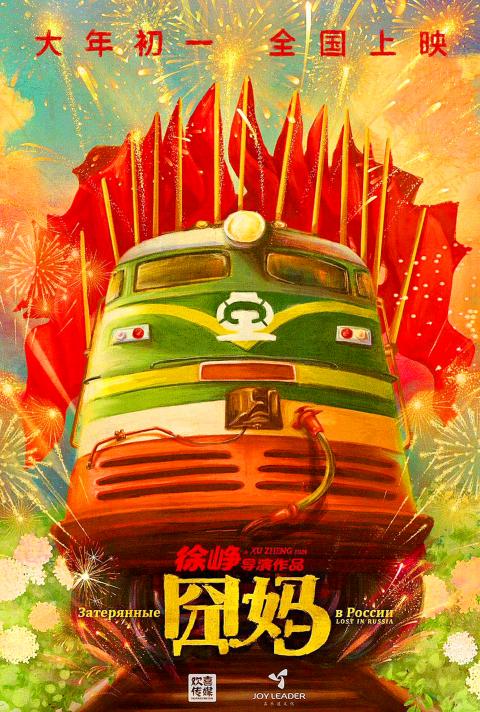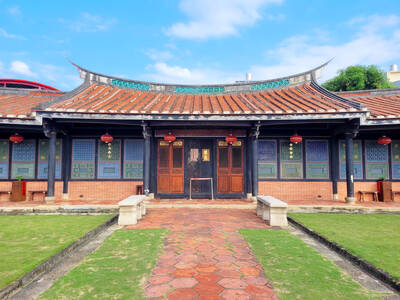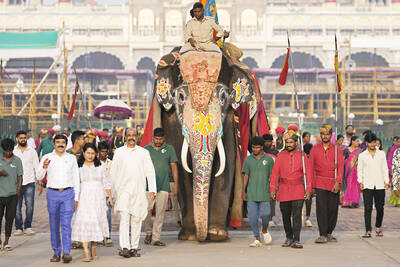China’s biggest week of the year for movie-goers is packed with at least 12 new releases — all in the local language — a sign that Hollywood studios are headed for another challenging year in their No. 1 overseas market.
The lineup of potential Lunar New Year blockbusters from Jan. 24 to Jan. 30 is drawing even more attention than usual because China is set to overtake the US as the world’s largest movie market this year. The milestone is important as well for US filmmakers that have come to rely on revenue from China to backstop big-budget “tentpoles,” films made to be big earners to offset the financial riskiness of a studio’s other titles.
“Chinese and American audiences are tired of these tentpole movies,” said Beijing-born Jean Su, a producer and co-founder of Broadvision Pictures, a Los Angeles-based independent film and TV studio that focuses on movies for global audiences including North America and China. She said some recent tentpoles haven’t done well in the US and may not get the box office they expected in China, either.

Photo courtesy of Wikimedia Commons
The rising dominance of Chinese blockbusters is in line with a broader shift toward local goods as a trade war with the US stokes nationalism. Older American franchise films like Fast & Furious and Transformers, that used to offset mediocre box-office sales in the US with big China receipts, have seen their share of China’s estimated US$29 billion movie market dwindle.
HOLIDAY MENU
At the same time, some of China’s franchises are seen as on the rise.

Photo courtesy of Wikimedia Commons
Detective Chinatown 3 and Lost in Russia, installments of two of China’s most commercially successful comedies, are among the films forecast to do well over the holiday. Leap, based on the true story of the Chinese women’s volleyball team, is another potential blockbuster amid rising interest in nationalistic themes.
While China’s filmgoers are becoming choosier, especially when it comes to Hollywood movies, there’s still a big Chinese audience for great work from the US, said Gary Michael Walters, chief executive officer of Los Angeles-based Bold Films, which produced films such as Whiplash and Nightcrawler.
Overall box-office sales increased by 4.1 percent in China last year, while the slice accounted for by Hollywood titles fell to about 36 percent, the lowest since at least 2011, according to data from Maoyan Entertainment.
Even if Hollywood’s market share in China drops for another year, US films will probably show a net gain in revenue from the country, given broader growth in the market, predicts Walters.
AMERICAN SUCCESSES
There were some successes last year among US films in China.
Disney’s Marvel franchise Avengers: End Game had US$614 million in gross box-office last year in China, enough to make it the year’s third-biggest film there, according to IMDb.
A gain this year in China would have to come without the likes of an Avengers: End Game, which did especially well as a popular franchise that tied up themes built up over years.
The first likely hit in China from Hollywood this year may be Mulan. Walt Disney’s US$150 million live-action feature starring Liu Yifei (劉亦菲), Donnie Yen (甄子丹) and Jet Li (李連杰) is scheduled for a March 27 China release, according to IMDb.
Some film studio shares have benefited from the second-half surge in China’s box-office last year. Beijing Enlight Media, the film company behind last year’s highest grossing movie in China, Ne Zha, gained 55 percent last year, the biggest annual surge since 2015. The stock rose as much as 1.7 percent in early Shenzhen trading Wednesday.
On the schedule for the Lunar New Year: The Rescue, a maritime disaster thriller directed by one of China’s most successful action movie directors Dante Lam (林超賢) and shot by Oscar-winning cinematographer Peter Pau (鮑德熹). Such action themes have been popular in China, with the Lam-directed Operation Red Sea, as the top-grossing film in 2018 and Wolf Warrior 2, reaching the all-time No. 1 box-office ranking.
Jiang Ziya: Legend of Deification, an animation based on an ancient Chinese legend, is ranked as the second-most anticipated film on the holiday schedule in a poll conducted by Maoyan. The most was Detective Chinatown 3.
“In the past, people wondered what would be the all-time highest sales if all of the top grossers were released during the same season,” said Liu Zhenfei, data analyst at China’s largest online ticketing platform Maoyan Entertainment. “This year, the Lunar New Year season is that kind of matchup, with what will probably be the best-of-the-best-selling films in one week.”

Last week saw the appearance of another odious screed full of lies from the People’s Republic of China (PRC) Ambassador to Australia, Xiao Qian (肖千), in the Financial Review, a major Australian paper. Xiao’s piece was presented without challenge or caveat. His “Seven truths on why Taiwan always will be China’s” presented a “greatest hits” of the litany of PRC falsehoods. This includes: Taiwan’s indigenous peoples were descended from the people of China 30,000 years ago; a “Chinese” imperial government administrated Taiwan in the 14th century; Koxinga, also known as Cheng Cheng-kung (鄭成功), “recovered” Taiwan for China; the Qing owned

When 17-year-old Lin Shih (林石) crossed the Taiwan Strait in 1746 with a group of settlers, he could hardly have known the magnitude of wealth and influence his family would later amass on the island, or that one day tourists would be walking through the home of his descendants in central Taiwan. He might also have been surprised to see the family home located in Wufeng District (霧峰) of Taichung, as Lin initially settled further north in what is now Dali District (大里). However, after the Qing executed him for his alleged participation in the Lin Shuang-Wen Rebellion (林爽文事件), his grandsons were

I am kneeling quite awkwardly on a cushion in a yoga studio in London’s Shoreditch on an unseasonably chilly Wednesday and wondering when exactly will be the optimum time to rearrange my legs. I have an ice-cold mango and passion fruit kombucha beside me and an agonising case of pins and needles. The solution to pins and needles, I learned a few years ago, is to directly confront the agony: pull your legs out from underneath you, bend your toes up as high as they can reach, and yes, it will hurt far more initially, but then the pain subsides.

A jumbo operation is moving 20 elephants across the breadth of India to the mammoth private zoo set up by the son of Asia’s richest man, adjoining a sprawling oil refinery. The elephants have been “freed from the exploitative logging industry,” according to the Vantara Animal Rescue Centre, run by Anant Ambani, son of the billionaire head of Reliance Industries Mukesh Ambani, a close ally of Prime Minister Narendra Modi. The sheer scale of the self-declared “world’s biggest wild animal rescue center” has raised eyebrows — including more than 50 bears, 160 tigers, 200 lions, 250 leopards and 900 crocodiles, according to